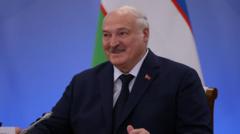Mozambique faces a pivotal moment as President Daniel Chapo takes office amidst widespread protests and challenges to Frelimo's authority
Unrest in Mozambique: A Prescient Inauguration Amidst Turmoil

Unrest in Mozambique: A Prescient Inauguration Amidst Turmoil
Inauguration of Daniel Chapo Set Against Backdrop of Political Discontent and Violence
Preparations are intensifying in Maputo, Mozambique, for President Daniel Chapo's inauguration on Wednesday following a contentious election that has drawn widespread allegations of fraud. The ruling party, Frelimo, once heralded as a liberator from colonial oppression, now deals with unprecedented public discontent and unrest.
Since the October elections, characterized by accusations of electoral malpractice from voters, international watchdogs, and political opposition, Mozambique has seen political turmoil escalate. The country of 33 million has been grappling with intense protests, seeking justice for what many perceive as a stolen election, leading to violent clashes with police forces—at least 300 lives have been lost during these confrontations.
As Daniel Chapo, affiliated with Frelimo, steps into the presidential role, he will have to navigate an atmosphere fraught with economic instability and social crisis, marking a stark contrast to the party's previous years of governance. Analysts indicate that Chapo's inauguration, instead of heralding a return to normalcy, may be indicative of the difficult road ahead for both him and the ruling party. Notably, two of the three main opposition parties boycotted the opening of Parliament, reflecting the deep divisions that have crystallized within the political landscape.
In the face of such struggles, President Chapo's challenge will be to foster reconciliation and effectively address the grievances of the disillusioned populace, a task that may prove more daunting than anticipated.
Since the October elections, characterized by accusations of electoral malpractice from voters, international watchdogs, and political opposition, Mozambique has seen political turmoil escalate. The country of 33 million has been grappling with intense protests, seeking justice for what many perceive as a stolen election, leading to violent clashes with police forces—at least 300 lives have been lost during these confrontations.
As Daniel Chapo, affiliated with Frelimo, steps into the presidential role, he will have to navigate an atmosphere fraught with economic instability and social crisis, marking a stark contrast to the party's previous years of governance. Analysts indicate that Chapo's inauguration, instead of heralding a return to normalcy, may be indicative of the difficult road ahead for both him and the ruling party. Notably, two of the three main opposition parties boycotted the opening of Parliament, reflecting the deep divisions that have crystallized within the political landscape.
In the face of such struggles, President Chapo's challenge will be to foster reconciliation and effectively address the grievances of the disillusioned populace, a task that may prove more daunting than anticipated.




















